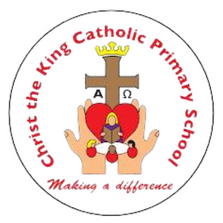Telephone +44 (0)1454 866680
MODERN FOREIGN LANGUAGES (MFL)
Our Mission Statement
'Making a difference by inspiring a love of life and learning for all. We build strong foundations within God's loving hands'.
Our Core Values
We provide a Catholic Christian education based on the life and teaching of Jesus Christ. Our Core Values. Our Core Values are inspired by Gospel values and stem from love - love is forgiveness, sharing and kindness. They are:
- Responsibility
- Compassion
- Respect
- Honesty
- Perseverance
- Courage
At Christ the King Catholic Primary School we inspire our children to have a lifelong love of learning through a broad, enriched and balanced curriculum. We aspire for all children to be the best they can be and make a difference to our world by building strong foundations within God’s loving hands.
Our Approach, Aim, and Curriculum
Our key curriculum drivers are:
- Inclusivity
- Creativity
- Curiosity
- Oracy
Intent
At Christ the King Catholic Primary School, we aim to inspire a lifelong curiosity about other languages, countries and cultures. Teaching should give pupils the knowledge linked to how languages can enable them to experience other cultures in our school and wider communities. Pupils will learn about the necessary skills to communicate effectively in another language (Spanish) and aspects of the Spanish culture and traditions. Skills taught will cover speaking, listening, reading and writing in Spanish as well as promoting an understanding of the Spanish culture. Spanish learning will be linked to other subject areas where applicable, developing our cross-curricular approach. The National Curriculum informs our chosen topics, which are sequential and include progression of skills. They aim to ensure children acquire basic skills and understanding of Spanish to communicate their ideas and opinions effectively. Children will understand how Catholic virtues and British Values relate to Spanish. There will be opportunities beyond the classroom for real life learning and for pupils to communicate with Spanish speakers and experience important Spanish traditions.
Implementation
Spanish is taught in (blocks) throughout the year so that children develop a deep and secure understanding. There are also links between Spanish and other areas of the curriculum where appropriate and where it adds value to both the subjects. Skills are built on year on year and sequenced appropriately throughout the school and lessons are planned using this document. Monitoring occurs regularly by the Curriculum Leads.
Children are introduced to Spanish in Year 3. Throughout KS2, children have a weekly lesson which is supplemented by the use of Spanish in daily routines such as calling the register or giving praise using words/phases in Spanish. There are also organised themed days that allow pupils to learn about important Spanish traditions such as Easter and Epiphany.
Spanish lessons are delivered by the class teacher using activities and units of work from Twinkl PlanIT Spanish, in addition to other resources which include games, videos, role play and songs.essons are scaffolded for those that need support to provide equity in provision and to maintain high standards of achievement for all pupils.
Impact
In line with the National Curriculum for MFL, by the time pupils leave CTK, they will be able to:
- Listen attentively to spoke language and show understanding by joining in and responding.
- Speak in sentences, using familiar vocabulary, phrases and basis language structures.
- Engage in conversations; ask and answer questions; express opinions and respond to those of others.
- Present ideas and information orally to a range of audiences.
- Read carefully and show understanding of words, phrases, and simple writing.
- Broaden their vocabulary and develop their ability to understand new words that are introduced into familiar written material, including through using a dictionary.
- Write phrases from memory and adapt these to create new sentences to express ideas clearly.
- Describe people, places, things, and actions orally and in writing.
- Understand basic Spanish grammar.
- Develop accurate pronunciation and intonation so that other understand when they are reading aloud or using familiar words.
- Appreciate poems, songs, and stories in Spanish.
- Develop a curiosity, understanding and respect for the Spanish culture.
We will measure the impact of our curriculum through the following methods:
- Assessment after each unit using the ‘jigsaw targets’.
- Observing children speaking and listening in Spanish.
- Images and videos of practical learning.
- Discussions about their learning through the use of pupil voice.
- Moderation of children’s work in staff meetings.
- Marking of written work in books.

Christ the King Catholic Primary School is a Voluntary Aided primary school. Registered Office: Easton Hill, Road, Thornbury, Bristol. BS35 1AW
Christ the King Catholic Primary School
